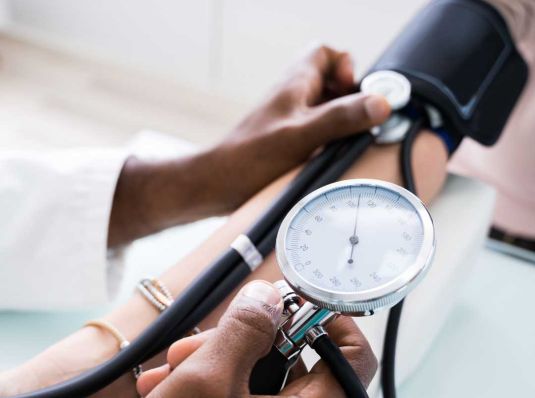High Blood Pressure (Hypertension)

What is Hypertension?
Hypertension, otherwise known as High Blood Pressure (HBP), occurs when your heart is pumping blood at an elevated rate for long periods of time. Your heart rate is supposed to rise and fall throughout the day, but having high pressure levels can increase your risk for heart disease and stroke.
Why Should You Care?
- 33% of U.S. adults have HBP
- That's approximately 68 million people!
- 69% of people with their first heart attack have HBP
- 77% of people who have their first stroke have HBP
- 74% of people who have chronic heart failure have HBP
- That's approximately 68 million people!
- HBP is a primary / contributing cause of death in 348,000 people
- Around $131 billion is spent in medical costs
- Approximately $25 billion is lost in worker productivity
- 30% of adults have prehypertension, which means that their blood pressure is borderline, but not in the HBP range
- Only 46% of people with HBP have their condition in control
Risk Factors / Causes
There are a few factors that can influence your chances for High Blood Pressure:
- low body water levels
- nervous system condition
- level of body hormones
- obesity or excess weight
- excessive alcohol consumption
- kidney disease
- blood vessel condition
- high salt intake
- family history
- anxiety and stress
- smoking
- ethnic background (African Americans are at higher risk)
Secondary Factors Include:
- Chronic kidney disease
- Adrenal gland disorder
- Pregnancy
- Narrowed arteries to kidneys
- Hyperparathyroidism
- Certain medications, such as:
- Birth control
- Diet pills
- Cold meds
- Migraine medication
Symptoms
The beginning stages of HBP, for some people, may appear to be silent without symptoms until pressure rises high enough to trigger any of the below.
- Eat a heart-healthy diet
- Lower total fat, saturated fat and cholesterol
- Exercise regularly
- Reduce stress
- Lower sodium intake to less than 1500 mg per day
- Stop smoking
- Maintain a healthy weight
- Limit alcohol intake
Source: Center for Disease Control
CIS does not provide medical advice, diagnosis or treatment. The content provided is for informational purposes only.
Back To Health Education